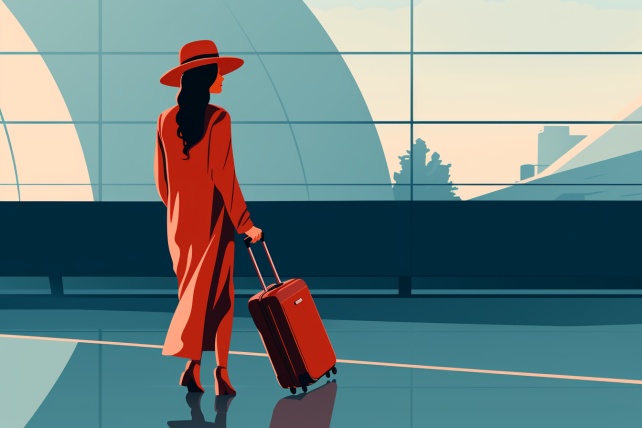If airfares confuse you as much as they confuse me, then I have some good news: Several new rules are going to make it easier to calculate the total cost of a ticket.
Maybe.
Starting Jan. 26, a new U.S. Transportation Department rule will require airlines to include all taxes and fees in their advertised fares. Other provisions of the rule — banning post-purchase price increases and allowing passengers to hold certain reservations without payment or to cancel them without penalty for 24 hours after booking — will take effect Jan. 24.
The DOT is also requiring airlines to disclose baggage fees when passengers buy a ticket, mandating that the same baggage allowances and fees apply throughout a journey, and stipulating that those fees be shown on electronic ticket confirmations.
Airline industry pushes back
The airline industry, which fought many of these requirements during the rulemaking process, isn’t quietly complying.
In June, Allegiant Air and Spirit Airlines tried to block several of the new rules, including the 24-hour grace period and some of the fee disclosure requirements. The airlines charged the government with trying to re-regulate them and limiting their right to free speech.
The matter remains tied up in the U.S. Court of Appeals for the District of Columbia. And in November, several airline industry organizations, including Airlines for America, which represents the domestic air carriers, filed a join request to postpone a rule that would require the same baggage rules to apply throughout an entire itinerary that departs from or ends in the United States. It also asked for a stay on a rule that makes them tell the passenger what baggage rules apply at the time of purchase and in the e-ticket receipt for itineraries to or from the United States.
Technical challenges over new rules
The industry’s stated reasons for these objections are not political but technical. It says that the systems aren’t yet in place to offer such disclosure. “Critical sources of information needed to comply with these rules do not yet exist,” says Steve Lott, a spokesman for Airlines for America. “This extension would give carriers essential time to overcome fundamental changes in baggage rules that require substantial investment and re-engineering of carrier reservations, check-in and baggage information systems, in addition to retraining of airline employees.”
An extension might also allow airlines to continue earning more money from baggage fees until 2013. Even a small rule change could interfere with a revenue stream that has by most accounts allowed the industry to remain profitable in recent years.
The DOT hasn’t made a decision on the extension yet. But some believe that regardless of how it rules, the government needs to do more. Sen. Robert Menendez (D-N.J.) is pushing for even more disclosure from airlines. As the holiday travel season began, he and nine other senators called for “airfare transparency” that goes beyond the current rules.
Greater airfare transparency
In a letter to Transportation Secretary Ray LaHood, Menendez said airlines should not only make all fees available at the time of purchase but also keep information about fees up to date and make it possible for consumers to compare fares and fees at all points of sale.
The problem is that airlines continue to remove fees from their fares — a process called unbundling. For example, the first checked bag, a confirmed seat reservation, even the ability to carry a bag onto the plane all used to be included in a base fare but now might not be. Breaking them out leads to confusion and ultimately to customers paying more than they thought they would.
“If consumers are expected to pay fees for services that have historically been included in the base fare, then at the very least, they should be informed of all of the fees and their cost before they purchase the ticket,” Menendez wrote.
Airline baggage fees
And so here we are at the beginning of 2012, with fare shopping not as confusing as it was a year ago, but with a long way to go before it’s truly consumer-friendly. Air travelers are entitled to know how much their ticket will cost before they push the “buy” button, and the airline industry’s claims that it has been committed to full transparency have lacked credibility in the past, critics say.
Until now, airlines have claimed that their baggage fees are simple and that normal travelers can easily figure them out. But it turns out that the system isn’t that straightforward, even for the airlines that run it. All the exceptions and reservation rules make it kind of complex, actually.
Isn’t it a little ironic that the airlines, even with their billions of dollars in collected baggage fees and state-of-the-art computer systems, are having some trouble telling passengers how much their ticket will cost when they add a checked bag to the price?
Airline baggage fee rules
In a perfect world — perfect for air travelers, that is — the DOT would hold firm on its new rules, the courts would dismiss the lawsuit by Allegiant and Spirit and the government would create ironclad new rules that would make it clear to us exactly how much we’re paying for a ticket. (Here’s what to do if your flight has been canceled or delayed.)
But we don’t live in a perfect world. The airline industry’s claims about technology difficulties may have some merit. A court could side with the discount airlines trying to block the new rules. And the DOT, reluctant to draw criticism from the right about overregulation, may step back in an election year.
It’s a partial victory for passengers. Just a year ago, airlines were deceiving their customers — duping them into spending 20 to 30 percent more on their tickets, thanks to surprise fees.
At least they aren’t doing that anymore.




